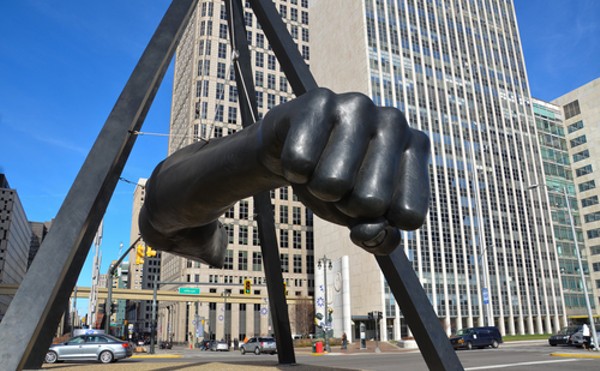The group Moratorium Now, along with its allies in the Occupy movement and others, has been racking up a string of victories since last December.
By taking to the streets — or even just threatening to take to the streets — the activists have been able to get big banks to reverse course and halt foreclosure-related evictions that seemed imminent.
The effort to help Chris Jaszczak keep his café, performance space and loft at 1515 Broadway in Detroit was a particularly high-profile crusade that resulted in Citibank giving the local businessman a loan modification instead of the boot, as it was ready to do.
But there have been less-noticed victories as well, including one last week when the Bank of New York Mellon relented and allowed Bertha and William Garrett to remain in their northwest Detroit home. They'd been renting a home that was foreclosed on. But instead of watching as their possessions were loaded into a Dumpster, the Garretts were instead allowed to purchase the place from the bank.
As heartening as these and other individual victories are, however, they remain anomalies. According to Detroit attorney Jerry Goldberg, a leader in the Moratorium Now! movement, warned that people should not be deceived by a` decline in foreclosures last year. There's good reason to keep the fight against banks going.
The California firm RealtyTrak, which monitors foreclosure activity, reported a significant slowdown in repossessions in 2011. The problem is, that decrease wasn't primarily because of improving economic conditions or the success of any programs designed to help owners retain their homes.
Rather, as RealtyTrak CEO Brandon Moore noted in a report:
"Foreclosures were in full delay mode in 2011, resulting in a dramatic drop in foreclosure activity for the year. The lack of clarity regarding many of the documentation and legal issues plaguing the foreclosure industry means that we are continuing to see a highly dysfunctional foreclosure process that is inefficiently dealing with delinquent mortgages ..."
Moore was referring, at least in part, to the issue of so-called "robo-signings" that involved the widespread failure of lenders to follow legally mandated procedures when foreclosing on property owners.
As the confusion was being sorted out, lenders held back on seizing properties. But the logjam that existed last year appears to be breaking.
"There were strong signs in the second half of 2011 that lenders are finally beginning to push through some of the delayed foreclosures in select local markets. We expect that trend to continue this year, boosting foreclosure activity for 2012 higher than it was in 2011, though still below the peak of 2010."
More than 1.8 million homes either received default notices or were foreclosed on last year. This year, that number is expected to exceed 2 million.
Michigan remains among the 10 states hardest hit by the crisis.
But it is a national issue. Which is why Goldberg reports that activists around the country are showing interest in a national conference intended to promote the moratorium and devise strategies that might help get it implemented. It will be held at the Central United Methodist Church in Detroit on Saturday, March 31.
"The demand for a moratorium on foreclosures has never been more timely," says Goldberg.
Certainly there is widespread dissatisfaction with efforts currently under way to prevent people from losing their homes. A recent Gallup poll found that 58 percent of Americans prefer the government take "further steps" to address the crisis.
For Goldberg and other activists, the surest way of addressing the problem is to institute a moratorium.
"Today, with the federal government owning or backing 75 percent of mortgage loans through Fannie Mae, Freddie Mac and HUD, and paying the banks full value for the inflated, fraudulent and predatory loans, the president has the absolute authority to implement a two-year moratorium on foreclosures and foreclosure-related evictions through executive order."
For more information on the conference phone 313-680-5508 or see nationalmoratorium.org.





